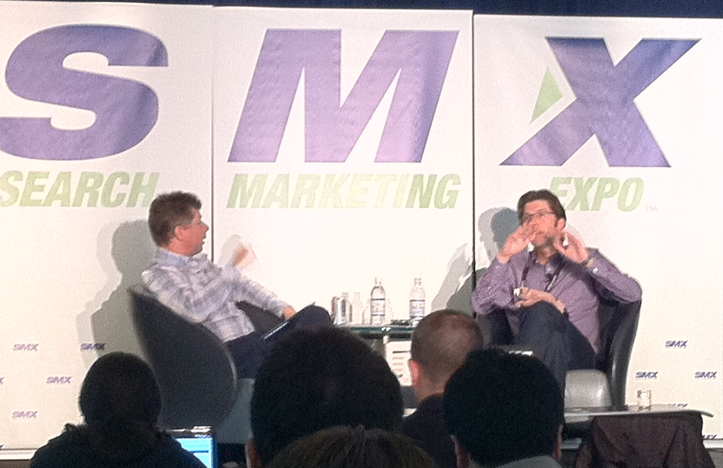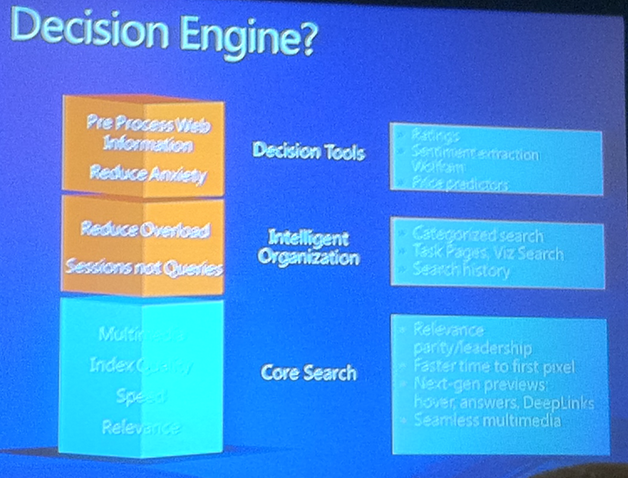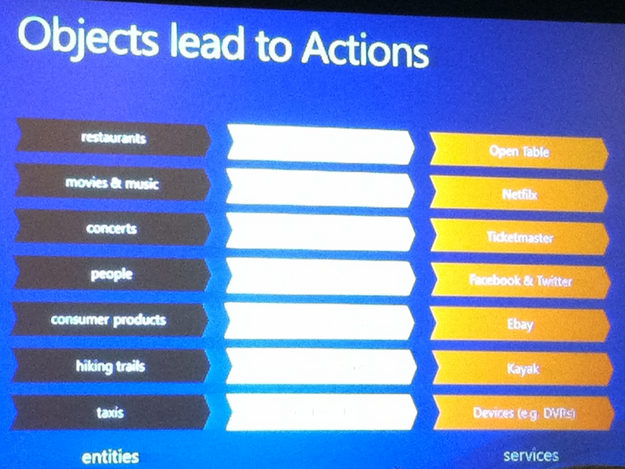At SMX Advanced Seattle, Bing's director of search, Stefan Weitz, says it is search engines' – and search marketers' – job to make search decisions easier. In order to achieve this, he believes search results need to be more conversational and actionable via social data. He suggested that social marketing is an integral part of Bing SEO (and optimization for any competitive search engine).
In his keynote address, Weitz said 5 exabytes of social data are uploaded to the web every couple of days and 4.8 billion results are available for any given search query. With this in mind, he explains that consumers are easily overloaded with information. “Ninety percent of people consult friends and family while they're making purchase decisions,” but this doesn't change the fact that it's hard to access this info on the web. Social sites aren't research-oriented, and, traditionally, search engines haven't offered social data, he says.
 Bing's Facebook friend effect is an effort to make recommendations accessible to people when they are searching. Bing has three areas of focus for the future of its search service: offer searchers insight from trusted friends, share data from the collective IQ around a given query and make search conversational to facilitate action. As far as privacy issues go, Weitz pointed out that users can control whether or not they see personalized results (on Bing) or share their like data to the search engine (in Facebook).
Bing's Facebook friend effect is an effort to make recommendations accessible to people when they are searching. Bing has three areas of focus for the future of its search service: offer searchers insight from trusted friends, share data from the collective IQ around a given query and make search conversational to facilitate action. As far as privacy issues go, Weitz pointed out that users can control whether or not they see personalized results (on Bing) or share their like data to the search engine (in Facebook).
Marketers should care about this friend-powered search, Weitz said, because this is a form of search that caters' to people's innate behaviors. He suggested that human's urge to form packs speaks to the need to offer social insight – they like to act with a group. Weitz also referenced a Harvard study showing that people are happier when they make decisions based on others' experiences. Moral of the story: marketers' social references have the potential to carry a lot of weight. (Indeed, Brafton has reported on the rising power of social referrals.)
Weitz acknowledges that Bing is not the only search engine moving into the social space. He referenced Google's use of Twitter data, and its +1 button. (Of course, Danny Sullivan pointed out that the power of Facebook info is that searchers can see information from their connections.) Weitz suggests that the whole industry is moving toward social data, which makes social marketing core to SEO. 
He also reminds attendees that the major search engines are currently working together on Schema.org. As Brafton reported, Schema.org offers a collection of tags marketers can use to improve the info search engines (plural!) have about their pages. Weitz said this is something marketers should take advantage of as it helps engines better understand how content relates to queries – which can also help search portals provide more actionable results on SERPs. (For instance, he says Bing might display Open Table on a SERP for a restaurant query.) 
While Weitz wouldn't confirm or deny, he danced around the idea that Schema might become a ranking signal in the future.
The insight shared on Bing search and SEO might be especially interesting to marketers as Microsoft's search portal seems to be generating buzz among Google searchers because of its social data. Is Weitz right in his theory that Bing's social search speaks to humans' innate behaviors? Will this help the search engine take a larger share of the market? Marketers will have to wait and see, but the company's steady search gains indicate Bing SEO could help them reach relevant audiences.



